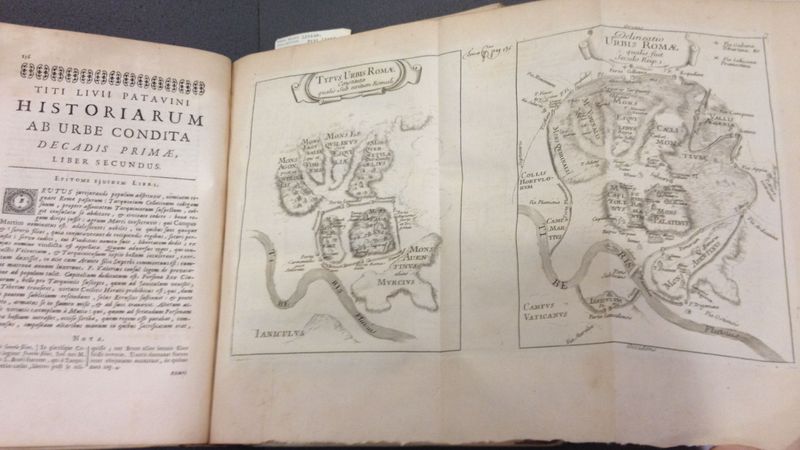Livy: Grandeur of the Temple

A page of text and fold-out map of ancient Rome, from Livy's Ab urbe condita, (Paris, 1679-1682). Special Collections, Wellesley College.
In the late first century BCE, the Roman historian Livy wrote Ab urbe condita, "From the Founding of the City," a history of Rome. Livy consistently emphasizes the majesty of the Temple of Jupiter throughout his history. Tarquinius Priscus first lays the foundations "in a spirit that foresaw the future grandeur of the site."1 Later in the text, he sets aside war spoils to build the Temple, "whose magnificence would be worthy of the king of gods and men, of the Roman empire, and of the majesty of the site itself.”2 Livy's statement that the Temple must be worthy of the not-yet-existent Roman empire reflects his assertive attitude towards the dominance of the nascent civilization. It could also reflect Livy's hindsight, looking back from his point in history, the early Empire. While building the Temple, an intact human head was discovered, an omen which “undoubtedly foretold that this was to be the citadel of empire and the head or capital of the world.”3 The Temple of Jupiter not only honored Jupiter, it symbolized the dominance of Roman civilization. According to Livy, the Temple was dedicated in 509 BCE by the consul Horatius Pulvillus.4
1 Livy, Ab urbe condita., trans. Valerie M. Warrior (Indianapolis: Hackett, 2006), 56-57.
2 Livy, Ab urbe condita., trans. Valerie M. Warrior (Indianapolis: Hackett, 2006), 73.
3 Livy, Ab urbe condita., trans. Valerie M. Warrior (Indianapolis: Hackett, 2006), 76.
4 Livy, Ab urbe condita., trans. Valerie M. Warrior (Indianapolis: Hackett, 2006), 93-94.